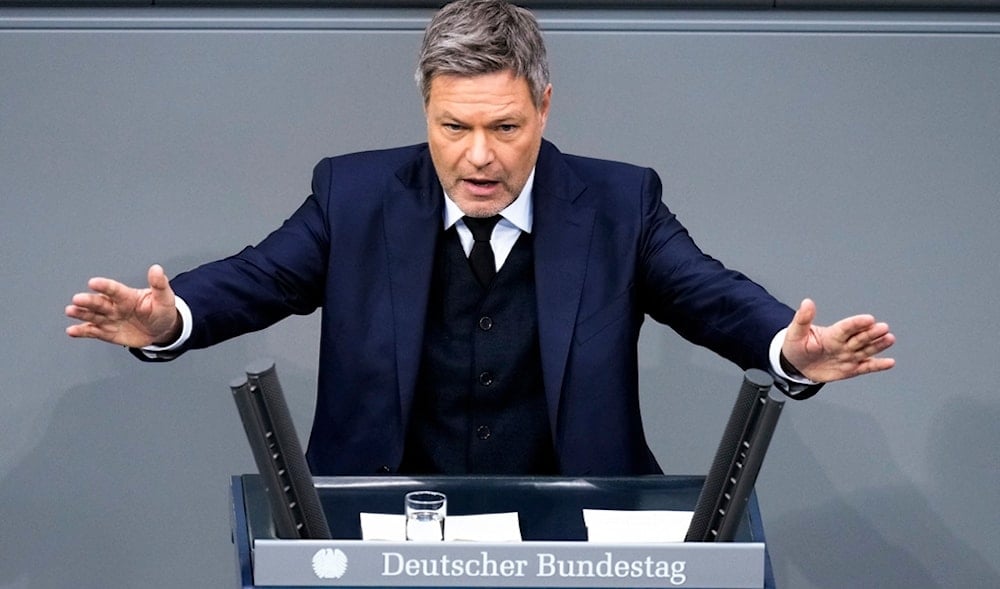Germany cuts GDP forecast to zero, citing Trump tariffs
Germany expects zero GDP growth in 2025, with Economy Minister Habeck blaming US tariffs under Trump. German exports and trade hit by global economic shifts.
-

Germany's Vice Chancellor and Economy and Climate Minister Robert Habeck speaks during the last parliament session ahead of national elections at the Bundestag parliament in Berlin, Germany, Feb. 11, 2025 (AP)
Germany’s economy is projected to record zero growth in 2025, outgoing Economy Minister Robert Habeck announced on Thursday, attributing the stagnation to US President Donald Trump’s tariff policies.
“The US trade policy of threatening and imposing tariffs has a direct impact on the German economy, which is very export-oriented,” Habeck said while presenting the latest forecast. The German government had initially anticipated a modest GDP growth of 0.3 percent for 2025, but has now revised the figure to zero for Europe's largest economy, which has already contracted over the past two years.
The government also lowered its growth outlook for 2026 from 1.1 percent to 1 percent.
Trump’s tariffs hit German exports hard
The United States, Germany's largest trading partner, absorbed about 10 percent of German exports last year, including automobiles and chemicals. Under Trump, Washington has imposed a 10 percent tariff on European Union exports, after initially threatening a 20 percent rate.
“Tariffs and trade policy turbulence are hitting the German economy harder than other nations,” Habeck noted. “We depend on open markets, functioning markets, and a globalised world. That’s what has made this country rich,” he added at a press conference in Berlin.
Political uncertainty and lack of stimulus deepen stagnation
German GDP declined by 0.3 percent in 2023 and 0.2 percent in 2024, driven by surging energy prices following Russia's full-scale invasion of Ukraine and intensified competition from China in key sectors such as automobiles and machinery.
“I would say that we are going through a paradigm shift when it comes to the basic earners for the German economy,” Habeck said. “Our big trade partners, China and the USA, and our neighbour, Russia, are causing us problems.”
The minister also criticized the lack of economic initiatives since the collapse of Chancellor Olaf Scholz’s coalition government in November, which led to new elections scheduled for February.
“For half a year now, hardly any initiative has been taken to counteract the stagnation through legislation or measures,” Habeck said.
Future hopes pinned on new investments
Looking ahead, Habeck expressed hope that a new debt-financed spending package, amounting to hundreds of billions of euros, would help revive the German economy in 2025 under the incoming Chancellor Friedrich Merz.
“It’s good that investments are finally being made,” Habeck said, noting that they “can offset the slump or the pressure on foreign trade to some extent.” The forecast factored in this “positive impetus” and assumed no further escalation of the tariff situation.
German industry calls for swift EU action on tariffs
Habeck urged future German leaders to bolster European unity and independence to better compete with global economic powers. “Made in Germany is over,” he declared. “We are a single market and it is through that market that we will bring investment back into Europe.”
“We must support the EU in taking a clear position, in negotiating confidently with the USA, and at the same time helping it be prepared to impose effective counter-measures.”
“The situation of the German economy is serious,” said Helena Melnikov, head of the German Chamber of Industry and Commerce. She called on the next federal government to urgently resolve the EU-US tariff dispute, stressing that time is running out.
Read more: US no longer sole guarantor of European security: Hegseth

 4 Min Read
4 Min Read










